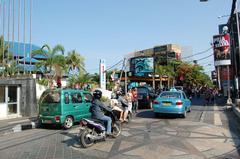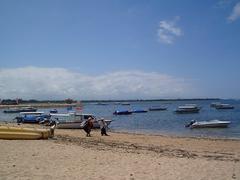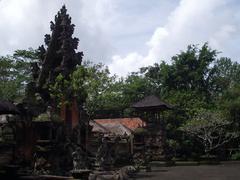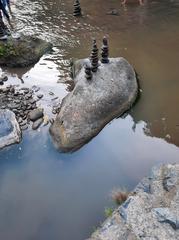Ngurah Rai Stadium: Visiting Hours, Tickets, and Complete Travel Guide to Denpasar’s Historic Landmark
Date: 04/07/2025
Introduction
Ngurah Rai Stadium, centrally located in Denpasar, Bali, is a historic and cultural landmark that embodies the island’s spirit of resilience and community. Named after I Gusti Ngurah Rai, a revered national hero, the stadium serves as more than just a sports venue—it is a living tribute to Balinese heritage and identity. This guide offers detailed, up-to-date information on visiting hours, ticketing, accessibility, nearby attractions, and practical travel tips to help you fully experience the vibrant atmosphere and historical significance of this iconic Denpasar site. Whether you’re a sports fan, history enthusiast, or cultural explorer, Ngurah Rai Stadium promises a meaningful connection with Bali’s past and present.
Table of Contents
- Origins and Naming of Ngurah Rai Stadium
- The Legacy of I Gusti Ngurah Rai
- Community and Cultural Significance
- Stadium Architecture and Facilities
- Visitor Information: Hours, Tickets & Accessibility
- How to Get There and Nearby Attractions
- Event Atmosphere and Local Tips
- Frequently Asked Questions (FAQ)
- Conclusion and Visitor Encouragement
- References and Further Reading
Origins and Naming of Ngurah Rai Stadium
Ngurah Rai Stadium is named in honor of I Gusti Ngurah Rai, a legendary Balinese leader renowned for his sacrifice during Indonesia’s struggle for independence. Born in Denpasar in 1917, Ngurah Rai led a pivotal resistance against Dutch colonial forces, culminating in the Battle of Margarana in 1946, where he and his troops engaged in a traditional Balinese “puputan” (fight to the death) (bali.com). The stadium’s dedication to his name reflects Bali’s enduring reverence for his heroism, with his legacy also commemorated in schools, streets, monuments, and the island’s international airport.
The Legacy of I Gusti Ngurah Rai
Early Life and National Impact
Raised amidst colonial rule and burgeoning nationalist sentiment, Ngurah Rai pursued military and legal studies, becoming a key figure in the fight for Indonesian independence after World War II. His leadership and ultimate sacrifice at the Battle of Margarana remain a powerful symbol of Balinese courage and unity (bali.com).
National Recognition
Ngurah Rai was posthumously declared a National Hero of Indonesia in 1975. His story is integrated into Balinese education and commemorated through annual ceremonies, reinforcing his enduring influence on local and national pride.
Community and Cultural Significance
Ngurah Rai Stadium is a dynamic hub for sports, community gatherings, and cultural ceremonies. It regularly hosts football matches—including those of Perseden Denpasar—athletic competitions, concerts, and festivals, making it a focal point for local engagement (Football Tribe Indonesia). Traditional Balinese performances and commemorative events are often held here, blending athleticism with rich cultural heritage (milesbeforesunrise.com).
The stadium has played a central role in nurturing local football talent through youth tournaments and school competitions, serving as a launchpad for many athletes who have gone on to represent Bali and Indonesia (Football Tribe Indonesia).
Stadium Architecture and Facilities
Ngurah Rai Stadium, with a capacity of 10,000–12,000, offers a classic open-air Indonesian stadium design. Seating includes uncovered concrete benches, a main grandstand with limited shelter, VIP and media sections, and basic facilities such as restrooms and locker rooms. The natural grass pitch is surrounded by an athletics track, suitable for both football and track-and-field events.
Additional amenities within the GOR Ngurah Rai complex include tennis and basketball courts, supporting a range of community and sporting activities. While some facilities are dated, ongoing and planned renovations aim to modernize the stadium with improved roofing, seating, sanitation, and accessibility (Viva.co.id).
Visitor Information: Hours, Tickets & Accessibility
Visiting Hours
- General Access: Typically open 8:00 AM to 6:00 PM, with extended hours during matches or events.
- Event Days: Gates open about 1 hour before kickoff; check the stadium’s social media or official website for up-to-date schedules.
Tickets
- Regular Events: Entry is often free for local matches and community events.
- Major Events: Tickets are sold at the stadium’s ticket booths (cash preferred) and, for select events, via authorized online platforms. Prices range from IDR 20,000 to 100,000 depending on event and seating.
Entry and Security
- Security checks and bag inspections are standard.
- Advance ticket purchase is recommended for popular events.
Accessibility
- Ramps at main entrances and some designated wheelchair seating (advance reservation suggested).
- Facilities for disabled visitors are basic but scheduled for improvement.
- Parking for disabled visitors is available near main entrances.
How to Get There and Nearby Attractions
Transportation
- By Car/Ride-Hailing: The stadium is centrally located in Denpasar, about 25–35 minutes from Ngurah Rai International Airport. Taxis and ride-hailing apps (Grab, Gojek) are convenient options.
- Public Transport: Local buses and minibuses (bemo) serve main roads nearby.
- Parking: Onsite and adjacent parking available, but limited during major events; arrive early.
Nearby Attractions
- Bajra Sandhi Monument: Learn about Balinese history and independence (YourLayoverGuide).
- Bali Museum: Displays local art, history, and culture.
- Pasar Badung Market: Experience local crafts and Balinese daily life.
- Pura Jagatnatha: A significant Hindu temple.
- Sanur Beach: For post-event relaxation.
- Ngurah Rai Mangrove Forest: Nature reserve for birdwatching and walking trails.
Event Atmosphere and Local Tips
- Atmosphere: Expect lively crowds, chanting, and family-friendly excitement during football matches and events.
- Dress Code: Light clothing, hat, and sunscreen recommended. Modest attire is appreciated during cultural ceremonies.
- Food & Drink: Local snacks (bakso, nasi goreng, satay) and drinks sold by vendors; most accept cash only.
- Weather: Bali’s climate is hot and humid year-round; bring sun/rain protection, especially for open-air seating.
- Language: Bahasa Indonesia is primary; basic English is spoken.
- Mobile & WiFi: Good coverage; WiFi not available inside the stadium.
Frequently Asked Questions (FAQ)
Q: What are Ngurah Rai Stadium’s regular visiting hours?
A: Usually 8:00 AM–6:00 PM, with extended hours for events. Confirm via official channels before your visit.
Q: How do I buy tickets for events?
A: At the stadium ticket booth (cash preferred) or online for major events. Local matches are often free.
Q: Is Ngurah Rai Stadium accessible for wheelchair users?
A: There are ramps and some designated seating; however, accessibility is limited and upgrades are planned.
Q: Are guided tours available?
A: Not regularly, but some community organizations may offer special tours during significant events.
Q: What transportation options are available?
A: Taxi, ride-hailing apps, public buses, and limited onsite parking.
Q: Are there food and beverage options at the stadium?
A: Yes, local vendors offer snacks and drinks during events.
Conclusion and Visitor Encouragement
Ngurah Rai Stadium stands as a vibrant testament to Bali’s sporting passion, historical legacy, and community spirit. As renovations progress and community events continue, the stadium remains a must-visit for anyone interested in Denpasar’s living history. By planning your visit around event schedules, purchasing tickets in advance, and exploring the rich cultural sites nearby, you’ll gain a deeper appreciation for both the stadium and Bali’s enduring heritage.
Stay updated by following official channels and consider using travel platforms like the Audiala app for the latest news, event schedules, and tips. Experience the unique blend of sport, culture, and history at Ngurah Rai Stadium—an essential stop on your Balinese journey.
References and Further Reading
- Ngurah Rai Stadium Historical Overview – bali.com
- Stadion Ngurah Rai: Football and Community Hub – Football Tribe Indonesia
- GOR Ngurah Rai Revitalization News – Viva.co.id
- Bali Layover and Travel Guide – YourLayoverGuide
- Rough Guides: Denpasar
- Detik: Perseden Denpasar News
- Transfermarkt: Stadium Info
- Salut Bali: Denpasar Tips
- BaliHolidaySecrets: Volcano Guide
Images and interactive maps showcasing Ngurah Rai Stadium, event atmospheres, and nearby attractions are recommended for visual planning.




